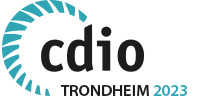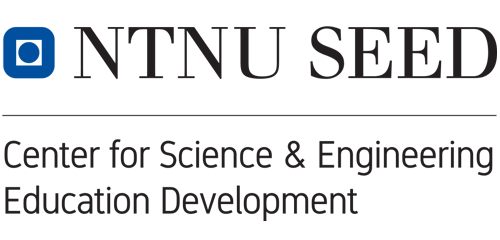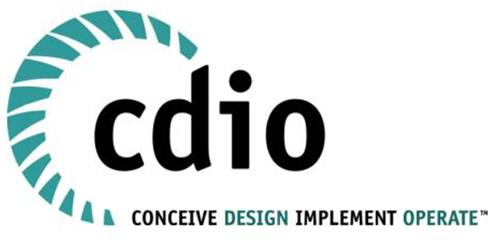Parallel sessions Tuesday
Parallel sessions Tuesday
Subject to changes.
Parallel sessions 0
Poster session: Various CDIO topics
Poster session: Various CDIO topics
1100–1200
Paper: 2
Salim Mohamed Salim
Challenge-based Learning: A Case Study in Computer Aided Engineering
Paper: 20
Linda Steuer-Dankert
Training Future Skills - Sustainability, Interculturality & Innovation in a Digital Design Thinking Format
Paper: 36
Amin Majd, Juha Kalliovaara, Tero Jokela and Jarkko Paavola
Designing and Implementing Components for an Autonomous Research Vessel in RDI Course
Paper: 68
Ho Yenn Giin and Leong Yiat Yam
A CDIO Approach to Teach Sustainability in Architecture
Paper: 84
Tony Topping, Matt Murphy and Samuel Saunders
Evaluating the Use of ITP Metrics in Supporting Teamwork
Paper: 85
Tony Topping, Matt Murphy and Samuel Saunders
Enhanced Assessment and Learning through Adaptive Comparative Judgement
Paper: 110
Mari Ketola, Anne Norström and Piia Nurmi
Learning Environments Supporting the Development of Resilient and Innovative Problem Solvers
Paper: 113
Tomoharu Kaeriyama, Jun Sato and Satoru Yamada
Design and Evaluation of Basic Exercise Environment for Virtual Laboratory
Paper: 133
Hang T.N. Ha, Anh Duc Bui, Tan Tran and Van Thu Van
Perception of Students and Instructors on Virtual Learning: A Case of DTU
Paper: 141
Achyut Sapkota, Natsu Kitagawa, Hiromasa Ogawa and Kanae Tsuchiya
On the Realization of Restrictions-free Active Classrooms in the Post-Covid Era
Paper: 144
Qi Dong, Xiang Li, Mingbao Zhang, Dongyang Chu, Tingting Zhao and Dongyang Li
Microwave Intervention Simulation Teaching Reform Based on CDIO Engineering Education Model
Paper: 154
Mingbao Zhang, QingHui Wang, Xiang Li, Rui Zhang and Yirunhan Pan
Virtual Simulation Teaching Exploration of Endotracheal Intubation Led by CDIO Concept
Paper: 162
Krys Bangert, Edward Browncross, Matteo Di Benedetti, Harry Day and Andrew Garrard
Comparing XR and Digital Flipped Methods to Meet Learning Objectives
Paper: 166
Hsin-Yi Kung, Yuan-Hsiu Lin, Chun-Chieh Sun and Ching-Yi Lee
Embedding CDIO Framework in Educational Statistics Courses with Serious Games
Paper: 167
Ching-Yi Lee, Yuan-Hsiu Lin, Chun-Chieh Sun and Hsin-Yi Kung
An Interdisciplinary Mathematics Project on CDIO Framework for Vocational High School Students
Paper: 180
Shandris Tuyaerts, Tinne De Laet, Lynn Van den Broeck and Greet Langie
Engineering Technology Students' Self-Regulation: A Baseline
Paper: 202
Jorgen Forss, Neil Cooke, Sarah Chung and Jesper Andersson
Maximising Academic and Social Outcomes
Tutorial: Introduction to CDIO, Part 1
Tutorial: Introduction to CDIO, Part 1
1100–1200
Introduction to CDIO, Part 1
Kristina Edström, Anders Rosén
Parallel sessions 1
Tuesday 1300–1430 (30–20–20–20)
Podium 1: Curriculum change and change leadership
Podium 1: Curriculum change and change leadership
Room R1
Session chair: Daniel Spooner
1300–1330
Paper: 11
Networking Change Leader – New Role for a Program Director in Engineering Education
Magnus Andersson
1330–1350
Paper: 67
Case Study on Integrated Curriculum Using Spiral Curriculum Model for Chemical Engineering
Katerina Yang, Ai Ye Oh, Siew Teng Phua and Yunyi Wong
1350–1410
Paper: 138
Framework for the Evaluation of Cybersecurity Curriculum Educational Content
Antti Hakkala, Anne-Maarit Majanoja, Ville Leppänen and Seppo Virtanen
1410–1430
Paper: 94
Engineering Minor in Architecture, a Model for Interdisciplinary Specialization and Contextual Learning
Reidar Lyng, Anders Ronnquist, Bendik Manum and Simen Dalen Taraldsen
Podium 2: Digital transformation in education
Podium 2: Digital transformation in education
Room R5
Session chair: Karina Mathisen
1300–1330
Paper: 214
Relation between Perception of Course Elements and Overall Impression: Evidence from 4015 Surveys
Alena Khaslavskaya and Ivan D. Sanchez-Diaz
1330–1350
Paper: 37
Blended Laboratories for Joining Technology
Shahram Sheikhi, Konstantin Bronstein, Eduard Mayer, Robert Langer, Azadeh Reise and Christian Stöhr
1350–1410
Paper: 42
Development of Simulation Tools to Enhance the Real-world Connections for Active Learner
Hiromasa Ohnishi
1410–1430
Paper: 54
Experiences on the Creation of a Multi-disciplinary Course in a Metaverse Environment
Elina Kontio, Werner Ravyse, Teppo Saarenpää, Emiliana Pizarro-Lucas, Ignacio Dorado-Diaz, Pedro L. Sanchez, Timo Haavisto and Mika Luimula
Podium 3: Reflection and Writing
Podium 3: Reflection and Writing
Room R7
Session chair:
1300–1330
Paper: 74
Student Reflective Practice as Part of Engineering Programmes
Gareth Thomson and Klara Kovesi
1330–1350
Paper: 127
Bringing Reflective Writing to the Engineering Classroom
Marcel Kyas, Joseph Timothy Foley and Markéta Foley
1350–1410
Paper: 43
The KTH Guide to Scientific Writing: Sparking a Conversation about Writing
Jane Bottomley, Jamie Rinder and Susanna Zeitler Lyne
1410–1430
Paper: 5
Reflections about Reflections
Svante Gunnarsson, Urban Forsberg and Daniel Axehill
Tutorial: Math Works sponsor presentation
Tutorial: Math Works sponsor presentation
1300–1400
Preparing Engineering Students for Impactful Careers in Industry
Rohit Agrawal
In this session, hear about the challenges that deans, department heads and educators face as they evolve their curricula to meet the ever-changing needs of industry and students. See how MathWorks aligns as a university partner by developing teaching tools and resources that help prepare students to fit industry and research workflows. This talk integrates MathWorks resources such as assignment autograding, online training courses, courseware, integrations with open source software (OSS), student programs, and capstone projects in a conversation about enabling educators to teach complex engineering concepts in an effective and engaging manner.
Roundtable: Sustainability
Roundtable: Sustainability
1300–1400
Paper: 152
Developing Introductory Courses Integrating Sustainability for Program Progression
Chirag Trevedi, Reidar Lyng and Geir Asle Owren
Roundtable: Engaging Labs
Roundtable: Engaging Labs
1300–1400
Paper: 66
Creating Authentic, Interdisciplinary, Engaging Undergraduate Laboratories
Joanne Tanner
Workshop 60 min: Interdisciplinary
Workshop 60 min: Interdisciplinary
1300–1400
Paper: 199
Develop an Interdisciplinary Course Using the Interdisciplinarity Toolbox
Coralie Johnson, Miles MacLeod, Klaasjan Visscher and Jan van der Veen
Parallel sessions 2
1500–1630 (30–30–15–15 / 30–30–30)
Podium 4: Sustainability in degree programs
Podium 4: Sustainability in degree programs
Room R1
Session chair: Anders Rosén
1500–1530
Paper: 155
Evaluating and Enhancing the Status of Sustainability in Engineering Programs
Anders Rosén, Eva Liedholm Johnson and Joakim Jalden
1530–1600
Paper: 209
Integrating Sustainable Development in a Computer Science Program: A Review
Marcia Muñoz, Claudia Martinez-Araneda and Matilde Basso
1600–1615
Paper: 207
Engineering Learning of Sustainable Product Lifecycle through CDIO
Adil Imam, Nicola Joyce and Anne Nortcliffe
1615–1630
Paper: 69
Integrating Interdisciplinary Education in Artificial Intelligence and Engineering Systems Curriculum
Sonia M. Gomez Puente and Karolina Doulougeri
Podium 5: Projects, outcomes, assessment
Podium 5: Projects, outcomes, assessment
Room R5
Session chair: Gabrielle Hansen
1500–1530
Paper: 19
Skills Assessment in Innovation and Entrepreneurship Education Initiatives
Alessandra Scroccaro, Jeanette Engzell, Charlotte, A. Norrman, Milena Bigatto and Cia Lundvall
1530–1600
Paper: 182
Assessment and Feedback across Various Outcomes in Project Courses: A Department-wide Study
Gabrielle Hansen and Guttorm Sindre
1600–1615
Paper: 103
Scaffolding Learning to Foster Students' Sustainability Competencies and Attitudes through Projects
Chew Lin Chia, Joo Ghee Lim, Kwee Teck Tan and Ser Khoon Toh
1615–1630
Paper: 16
Blended POGIL and Developer Blog Learning for Senior Project Implementation
Masoodhu Banu N.M, Deepa Beeta Thiyam and Padmanabha Sarma A
Podium 6: Entrepeneurship and creativity
Podium 6: Entrepeneurship and creativity
Room R7
Session chair: Per Fagrell
1500–1530
Paper: 88
Entrepreneurship in Engineering Programs: A Methodology for Systematic Literature Review
Saul Garcia Huertes and Ramon Bragos
1530–1600
Paper: 122
Visualizing Extracurricular Student Teams Learning at TU/e Innovation Space with CDIO Syllabus
Eugenio Bravo Cordova, Ana M. Valencia, Isabelle Reymen and Jan van der Veen
1600–1615
Paper: 108
Embodying Ideas in Teams Education
Shota Matsuhashi, Takurou Itoh, Takashi Morinaga, Hiromasa Ohnishi, Sou Takahashi, Hiroyuki Arafune and Ryo Satoh
1615–1630
Paper: 18
Creating Creative Engineers: Embedding Project Based Learning Throughout an Engineering Curriculum
Ahmed Tamkin Butt, Arooj Siddiqui and Edward William Causton
Podium 7: Worklife needs and gender balance
Podium 7: Worklife needs and gender balance
Room R9
Session chair: Lena Petersson
1500–1530
Paper: 12
From University to Work: Alumni Viewpoints
Helena Kovacs, Iris Capdevila, Isabelle Lermigeaux-Sarrade and Patrick Jermann
1530–1600
Paper: 175
Engineering or Computer Science, What Is the Deal?
Asrun Matthiasdottir
Podium 8: Bildung and becoming
Podium 8: Bildung and becoming
Room R2
Session chair: Birgit Krogstie
1500–1530
Paper: 213
Engaging Students Oriented towards Usefulness in a Bildung-oriented Engineering Education
Ronny Kjelsberg and Magnus Kahrs
1530–1600
Paper: 75
Who am I Learning to Become? Integrating Personal Development in Curriculum Design
Nina Bohm, MaartenJan Hoekstra, Leo PJ van den Burg and Milou Reincke
1600–1615
Paper: 38
Educating for Integrity: Blending the Liberal Arts and Humanitarian Engineering
Jeff Frank, Nikola Petrova, Peter Chemweno and Alberto Martinetti
Workshop: Emotional competence
Workshop: Emotional competence
1500–1600: Workshop 60 min
Paper: 188
Make It Awkward – Equipping Students to Address Microaggressions
Siara Isaac and Vivek Ramachandran
Roundtable: Agility
Roundtable: Agility
1500–1600
Paper: 79
The CDIO Standards' Agility
Suzanne Brink, Elizabeth Keller, Reidar Lyng and Sonia M. Gomez Puente
Roundtable: Organization Handbook
Roundtable: Organization Handbook
1500–1600
Paper: 50
Handbook to Guide Members on Organizing Key CDIO Activities
Mark Singh, Sin Moh Cheah, Helene Leong, Janne Roslöf and Juha Kontio



